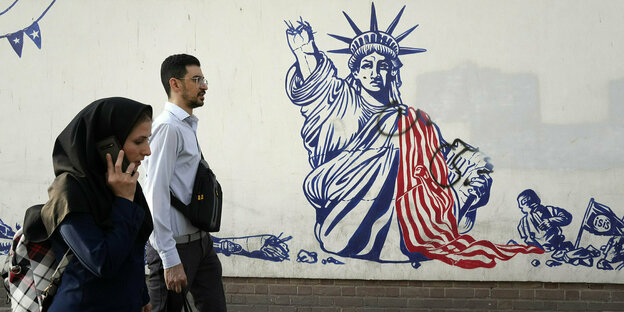There are more than two sides to the Middle East. Political scientist Renad Mansour on the motives of the regime and its allies.

Anti-American graffiti on the former US embassy in Tehran, but Iran is not interested in a real war Photo: Vahid Salemi/ap/dpa
Wochentaz: Mr. Mansour, there have been fears for months that the war in Gaza will spread, especially an escalation between the United States and Iran and its allies. There have been mutual airstrikes, but there has not been a full escalation. How do you assess the situation?
Renad Mansour: Iran and its allies in the region are not interested in a real war with the United States and Israel. They couldn't win it. It wouldn't be the type of fight they prefer. Iran is playing a longer game in which it can flex its muscles. Through its various networks, both armed and political, Iran is increasingly gaining influence throughout the region. America's influence, on the other hand, is declining and struggling to maintain it. Therefore, neither side prefers direct military confrontation. At the same time, they are forced to confront each other. Because each party wants to have the last word and not appear weak. It's a dilemma.
So we're just attacking each other?
Renad Mansour works as a researcher for the think tank Chatham House (London), the American University of Iraq and the University of Cambridge.
We have since October 7th. (the major attack by the Hamas terrorist group against Israel, editor's note) Nearly 200 attacks by resistance groups or Iranian allies were observed across the region. The United States has responded with attacks against resistance groups, particularly in Syria, Iraq and against the Houthis in Yemen. But the Biden administration still wants to withdraw from the region and wants to continue believing, as it did before October 7, that there is no longer any conflict in the region.
They talk about Iranian allies and resistance groups, but not representatives. Because?

The word deputy is a bit lazy. While it correctly describes these groups and their relationship with Iran as part of a network, the word suggests that they have no autonomy or agency. Of course, it is true that in many cases the interests between the groups and Iran converge. But there are cases where these groups deviate from Iran and its demands. It is a more complicated relationship. In Iraq, the popular mobilization units are not one group, but many different ones that compete with each other. Hezbollah in Lebanon is more centralized and closer to Iran. But there are also occasional disputes or, let's say, divergences between Hezbollah and Iran, as well as between the Houthis and Iran. These are alliances, even if they are asymmetrical alliances. But they are not representatives in the sense that they only represent without acting independently.
In fact, the United States also wanted to withdraw from Iraq the approximately 2,500 troops currently stationed there.
Before October 7, there was dialogue between the American and Iraqi governments on a road map for the withdrawal of American troops and a transition to normal bilateral relations. The Biden administration wanted to end this forever war, as it calls it, just as the United States did in Afghanistan. But after October 7 the equation is different. Violence in the region, waged between the United States and its Iranian allies, complicates the situation.
From their perspective, the Houthis appear to be currently operating most successfully among Iran's allied forces in Yemen. They are gaining popularity among the Yemeni population and seem to have a lot of freedom at the national level. What is the situation in Iraq and Lebanon?
The Popular Mobilization Units in Iraq and Hezbollah in Lebanon, like the broader political elite of both countries, have been in a legitimacy crisis for many years. The pro-Palestinian, anti-Israel, and anti-American course is an important means of regaining legitimacy by presenting itself as part of a broader resistance struggle. As the groups struggle internally with their own government and have faced protests in both Lebanon and Iraq in recent years, they hope to at least now give the impression that they are fighting for resistance and that they are fighting for support. .
In late January, US soldiers were killed by direct fire from pro-Iran forces in an attack on a US base in Jordan for the first time since October 7. The person responsible was a new group called “Islamic Resistance in Iraq.” Who is it?
The Islamic Resistance in Iraq is made up of groups that are also part of the Popular Mobilization Units, for example Kataib Hezbollah, Harakat Hezbollah al-Nujaba and Kataib Sayyid al-Shuhada. Unlike other popular mobilization groups that lean towards local and national politics, have a social base among the population and pursue internal politics, these are transnational groups that do not really participate in Iraqi politics. Kataib Hezbollah also has representatives in parliament, but this is a departure from the norm. Islamic Resistance groups are vanguard forces carrying out frontline violence across the region, particularly in Iraq and Syria.
Iraq is an ally of the United States.
The Iraqi government tries to have good relations with both the United States and Iran and all other neighbors. It seeks to apply a foreign policy of non-hostility. However, Iran has clearly gained influence while the United States has lost it. But we must not forget that many protesters and other Iraqis are disillusioned with both sides. They do not want Iran and the United States to turn their country into a battleground for their broader struggle.
Which of the two can ultimately prevail better?
Let us remember that in January 2020, the United States killed Qasem Suleimani, head of the Quds Corps of the Iranian Revolutionary Guard, as well as Abu Mahdi al-Muhandis, former head of the Iraqi Popular Mobilization Units, in an airstrike. Since then, the United States has gained neither influence nor power. All the US military attacks, all the attempts to sanction these groups are really not working. The United States does not have the political means to maintain its influence in the Middle East at this time. Iran, on the other hand, can use its media to maintain its influence. So from Iran's perspective, the competition can be won in the long run even if a direct war could not be won.